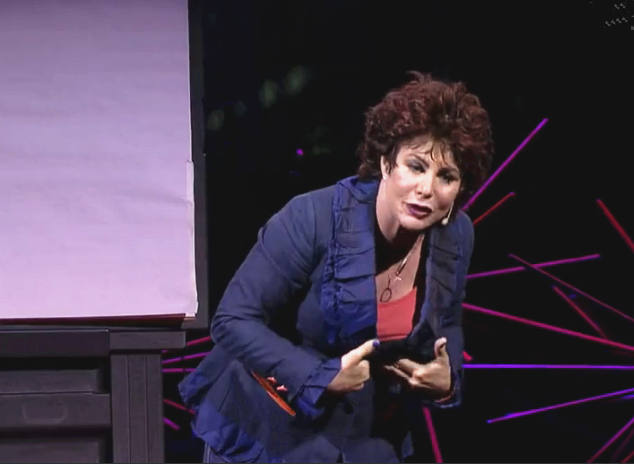Because, you know, the one thing, one thing that you get with this disease,
因為有一樣東西,得了這種病你會得到它
this one comes with a package, is you get a real sense of shame,
這是整套附送的,就是你會感到很羞恥
because your friends go, "Oh come on, show me the lump, show me the x-rays,"
因為你的朋友們會說 “來,給我看看腫塊,給我看看X光片”
and of course you've got nothing to show,
當然你什么都沒有可以拿來展示的
so you're, like, really disgusted with yourself because you're thinking,
你就會變得很厭惡自己因為你覺得
"I'm not being carpet-bombed. I don't live in a township."
“沒有很多人來看望我,我不是在城鎮(zhèn)里生活”
So you start to hear these abusive voices, but you don't hear one abusive voice,
你開始聽到很多謾罵聲,不是一聲兩聲
you hear about a thousand -- 100,000 abusive voices,
你能聽到近千個萬個謾罵聲
like if the Devil had Tourette's, that's what it would sound like.
就像惡魔患了抽動癥,聽起來就像那樣
But we all know in here, you know, there is no Devil, there are no voices in your head.
但我們在座的都知道,并沒有惡魔,你的頭腦中并沒有聲音
You know that when you have those abusive voices,
當你聽到那些謾罵聲時
all those little neurons get together and in that little gap
所有那些小神經(jīng)元會聚在一起,在那個小小的狹縫
you get a real toxic "I want to kill myself" kind of chemical,
你就會產(chǎn)生“我真想殺了自己”有毒的化學物質(zhì)
and if you have that over and over again on a loop tape, you might have yourself depression.
如果這種情況屢次發(fā)生,你可能會讓自己得抑郁癥
Oh, and that's not even the tip of the iceberg.
那還不到冰山一角

If you get a little baby, and you abuse it verbally,
如果你有一個小嬰兒,你常口頭辱罵它
its little brain sends out chemicals that are so destructive
它的小腦袋會發(fā)出非常具有破壞性的化學物質(zhì)
that the little part of its brain that can tell good from bad just doesn't grow,
以致它腦袋里面分辨美好事物的部分不再生長了
so you might have yourself a homegrown psychotic.
你就自己培養(yǎng)了一個精神病者
If a soldier sees his friend blown up,
如果一個士兵看到他的朋友被炸了,
his brain goes into such high alarm that he can't actually put the experience into words,
他的大腦會進入高度警戒狀態(tài),以致他無法把所經(jīng)歷的東西用語言表達出來
so he just feels the horror over and over again.
他只是一次又一次地感受到恐懼
So here's my question.
那么我有一個問題,
My question is, how come when people have mental damage, it's always an active imagination?
我的問題就是,為什么人們有精神創(chuàng)傷的時候,總被認為是主動想象造成的
How come every other organ in your body can get sick and you get sympathy, except the brain?
為什么其它身體器官生病時你會得到同情,而大腦除外呢
I'd like to talk a little bit more about the brain,
我想談多一些關于大腦的東西
because I know you like that here at TED,
因為我知道TED在座的各位喜歡聽
so if you just give me a minute here, okay.
請給我一點時間好嗎
Okay, let me just say, there's some good news.
我就這么說吧,有些好消息
There is some good news. First of all, let me say, we've come a long, long way.
有些好消息,首先,我想說,我們一路走來經(jīng)歷了很多
We started off as a teeny, teeny little one-celled amoeba,
我們從非常非常小的單細胞變形蟲
tiny, just sticking onto a rock, and now, voila, the brain.
很小的,貼在一塊石頭上,現(xiàn)在,看啊,到了大腦
Here we go.
我們開始吧
This little baby has a lot of horsepower.
這小東西有很大馬力
It comes completely conscious. It's got state-of-the-art lobes.
它是有完整意識的,它有新生的腦葉
We've got the occipital lobe so we can actually see the world.
因為有枕葉所以我們能看到世界
We got the temporal lobe so we can actually hear the world.
因為有顳葉所以我們能聽到世界上的聲音
Here we've got a little bit of long-term memory,
這里是我們有長期記憶的部分
so, you know that night you want to forget, when you got really drunk? Bye-bye! Gone.
你很想忘記某天晚上真的喝醉了,拜拜,忘記了
So actually, it's filled with 100 billion neurons just zizzing away, electrically transmitting information, zizzing, zizzing.
事實上,大腦有1000億個神經(jīng)元,帶電吱吱吱地傳導著信息,吱吱吱吱
I'm going to give you a little side view here.
我來給你們看看一些側(cè)觀
I don't know if you can get that here.
我不知道你們能不能看清楚
So, zizzing away, and so...
吱吱,那么...
And for every one I know, I drew this myself. Thank you.
對每個,這是我自己畫,謝謝
For every one single neuron, you can actually have
對每一個神經(jīng)元來說,你事實上可以
from 10,000 to 100,000 different connections
有1萬到10萬種不同的連接
or dendrites or whatever you want to call it, and every time you learn something, or you have an experience,
或神經(jīng)樹突或不管你怎么叫,每一次你學到東西或經(jīng)歷了一些事
that bush grows, you know, that bush of information.
樹突就會成長,就是信息的樹突
Can you imagine, every human being is carrying that equipment, even Paris Hilton?
你可以想象么,每個人都有那樣的裝備,甚至是帕麗斯·希爾頓



